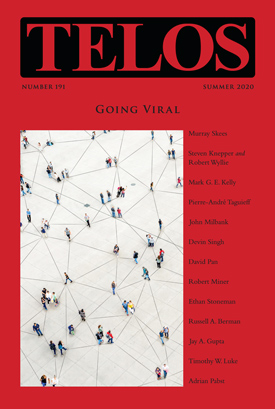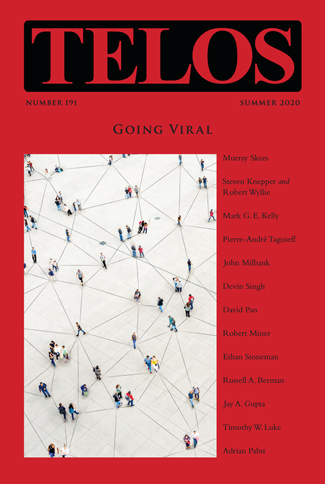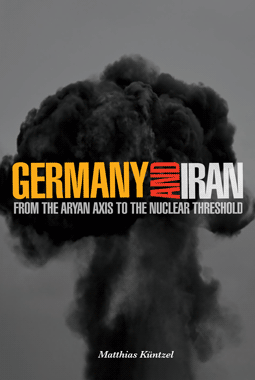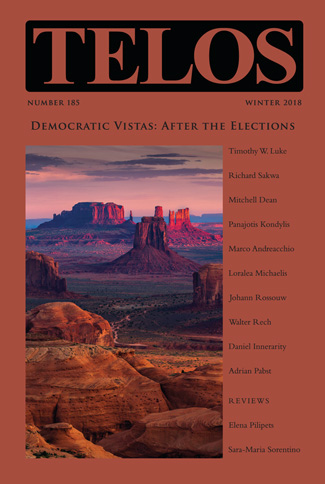By Russell A. Berman · Wednesday, June 17, 2020 The following essay is part of a group of responses to the COVID-19 pandemic that appear in Telos 191 (Summer 2020): Going Viral, which is now available for purchase in our store. Individual subscriptions to Telos are also available in both print and online formats.
 As of this writing, the precise origin of the Chinese virus, SARS CoV-2, remains unclear. It is however known that cases predated the eruption in the “wet market” in Wuhan—which in the meantime has been reopened, suggesting at least that Chinese authorities do not believe it was the source of the pandemic. The alternative theory that the virus escaped from experiments in one of Wuhan’s virology laboratories therefore remains plausible. In any case, it is certain that Wuhan was the first epicenter and that state authorities used repressive power to delay alerting the world by possibly more than a month. With that additional time, the spread of the disease might have been contained, or its dissemination at least impeded, if China and the World Health Organization had acted with transparency and integrity. They did not. As of this writing, the precise origin of the Chinese virus, SARS CoV-2, remains unclear. It is however known that cases predated the eruption in the “wet market” in Wuhan—which in the meantime has been reopened, suggesting at least that Chinese authorities do not believe it was the source of the pandemic. The alternative theory that the virus escaped from experiments in one of Wuhan’s virology laboratories therefore remains plausible. In any case, it is certain that Wuhan was the first epicenter and that state authorities used repressive power to delay alerting the world by possibly more than a month. With that additional time, the spread of the disease might have been contained, or its dissemination at least impeded, if China and the World Health Organization had acted with transparency and integrity. They did not.
Continue reading →
By David Pan · Monday, June 15, 2020 Telos 191 (Summer 2020): Going Viral is now available for purchase in our store. Individual subscriptions to Telos are also available in both print and online formats.
 While “going viral” has taken on a new meaning by recuperating an old one, it is the virtual experience that seems to be more enduring. Not only has the pandemic sped up the shifting of human activity onto virtual platforms, but the viral dynamics of social media seem set to outlast the microbial versions: it has turned out to be easier to lock down the Wuhan virus than President Trump’s Twitter feed. Yet in both cases, it is unclear whether it is the actual spread or the fear that is the greater danger. For this fear leads to the call for more authoritarian measures, whether this means censoring Twitter posts or locking down the population. But if viral spread leads to the reassertion of sovereignty, we also come to realize that the freedoms we have taken for granted are in fact the result of a curated space, in which the rules for interaction have always formed the hidden framework within which our lives have unfolded. As these framing conditions come into focus during the crisis, we have the opportunity to reimagine them in such a way as to retrieve sovereignty not as a kind of authoritarian reaction but as an understanding of how our values must inform the boundaries we set. This issue of Telos considers how the experience of going viral has come to dominate our political life as well as how our reflection on this process can free us to consider the alternatives. While “going viral” has taken on a new meaning by recuperating an old one, it is the virtual experience that seems to be more enduring. Not only has the pandemic sped up the shifting of human activity onto virtual platforms, but the viral dynamics of social media seem set to outlast the microbial versions: it has turned out to be easier to lock down the Wuhan virus than President Trump’s Twitter feed. Yet in both cases, it is unclear whether it is the actual spread or the fear that is the greater danger. For this fear leads to the call for more authoritarian measures, whether this means censoring Twitter posts or locking down the population. But if viral spread leads to the reassertion of sovereignty, we also come to realize that the freedoms we have taken for granted are in fact the result of a curated space, in which the rules for interaction have always formed the hidden framework within which our lives have unfolded. As these framing conditions come into focus during the crisis, we have the opportunity to reimagine them in such a way as to retrieve sovereignty not as a kind of authoritarian reaction but as an understanding of how our values must inform the boundaries we set. This issue of Telos considers how the experience of going viral has come to dominate our political life as well as how our reflection on this process can free us to consider the alternatives.
Continue reading →
By Matthias Küntzel · Friday, May 24, 2019 Matthias Küntzel’s Germany and Iran: From the Aryan Axis to the Nuclear Threshold, published by Telos Press Publishing, presents an extensive and detailed historical account of German–Iranian relations from the early twentieth century to the present. Save 20% on your purchase of Küntzel’s Germany and Iran in our online store by using the coupon code BOOKS20 during checkout. The following essay has been translated from the German by Matthew J. Cooper.
As late as May 7, 2019, France sent a message to Iran’s rulers: “We do not want Tehran to announce tomorrow actions that would violate the nuclear agreement, because in this case we Europeans would be obliged to reimpose sanctions as per the terms of the agreement.”
 The admonition was futile. On the following day, exactly one year since the United States withdrew from the nuclear agreement, Iran’s President Hassan Rouhani made two things public: He announced that effective immediately the regime no longer felt bound by the central provisions of the nuclear agreement. For example, by section 7, which requires the regime to limit its inventory of low-enriched uranium to 300 kg. Also affected is section 10, according to which Iran may not manufacture or store more than 130 tons of heavy water for fifteen years. Iran will not adhere to this provision either, according to Rouhani. Heavy water is used for reactors that are specially adapted for the production of weapons-grade plutonium. These quantitative restrictions on materials needed for nuclear weapons belong to the core of the agreement that Tehran is now avowedly violating. The admonition was futile. On the following day, exactly one year since the United States withdrew from the nuclear agreement, Iran’s President Hassan Rouhani made two things public: He announced that effective immediately the regime no longer felt bound by the central provisions of the nuclear agreement. For example, by section 7, which requires the regime to limit its inventory of low-enriched uranium to 300 kg. Also affected is section 10, according to which Iran may not manufacture or store more than 130 tons of heavy water for fifteen years. Iran will not adhere to this provision either, according to Rouhani. Heavy water is used for reactors that are specially adapted for the production of weapons-grade plutonium. These quantitative restrictions on materials needed for nuclear weapons belong to the core of the agreement that Tehran is now avowedly violating.
Continue reading →
By Telos Press · Wednesday, May 22, 2019 Writing at the American Interest, Matthias Küntzel analyzes the divide between the United States and Germany regarding Donald Trump’s decision last year to withdraw the U.S. from the nuclear deal with Iran. In his book Germany and Iran: From the Aryan Axis to the Nuclear Threshold, published by Telos Press Publishing, Küntzel presents an extensive and detailed historical account of German-Iranian relations from the early twentieth century to the present, which provides essential context for understanding this split. Save 20% on your purchase of Küntzel’s Germany and Iran in our online store by using the coupon code BOOKS20 during checkout.
An excerpt from Küntzel’s recent essay:
 Trump’s decision is not without risk. Given the nature of the Iranian regime, irrational responses and war scenarios can’t be ruled out. Exactly one year after the United States left the deal, Iranian President Hassan Rouhani announced a partial withdrawal, saying Iran would keep excess enriched uranium and heavy water instead of selling it. Continuing the policy of nuclear blackmail, he threatens to resume higher uranium enrichment after 60 days. However, at least for the time being, Tehran seems not to be interested in a massive escalation. Trump’s decision is not without risk. Given the nature of the Iranian regime, irrational responses and war scenarios can’t be ruled out. Exactly one year after the United States left the deal, Iranian President Hassan Rouhani announced a partial withdrawal, saying Iran would keep excess enriched uranium and heavy water instead of selling it. Continuing the policy of nuclear blackmail, he threatens to resume higher uranium enrichment after 60 days. However, at least for the time being, Tehran seems not to be interested in a massive escalation.
Trump’s alternative approach—to put sufficient economic and political pressure on the Iranian leadership to compel it to sign a new agreement that would address not only Iran’s nuclear ambitions but also its missile program and regional warmongering—may be a long shot, but it is worth trying. Effective sanctions, however, require the cooperation of Iran’s most important trade partners, Germany and the European Union. And that is where the problem starts.
Continue reading →
By Russell A. Berman · Wednesday, December 12, 2018 Telos 185 (Winter 2018) is now available for purchase in our store. Individual subscriptions to Telos are also available in both print and online formats.
 Recall the 2016 campaign and even more the aftermath of the Trump victory: otherwise reasonable people rushed into heated rhetoric regarding the imminence of dictatorship and the end of democracy as we know it. Comparisons of the America of 2016 and Germany of 1933 proliferated, while denunciations of Republicans as Nazis or Nazi collaborators became common. It would be a worthwhile project for a student or scholar of American culture to cull through those statements and confront their authors with them today: if they were so wrong in 2016, what value is their judgment today, moving forward? Recall the 2016 campaign and even more the aftermath of the Trump victory: otherwise reasonable people rushed into heated rhetoric regarding the imminence of dictatorship and the end of democracy as we know it. Comparisons of the America of 2016 and Germany of 1933 proliferated, while denunciations of Republicans as Nazis or Nazi collaborators became common. It would be a worthwhile project for a student or scholar of American culture to cull through those statements and confront their authors with them today: if they were so wrong in 2016, what value is their judgment today, moving forward?
For those predictions were simply and utterly wrong. Of course, the Republican in the White House and the Republican-controlled Congress pursued a version of a conservative agenda (although not always with success, as in the case of health care). But the rule of law prevailed, courts could decide against the government, the liberal part of the press has been articulate in its critique of administration policies, and, in a quite normal and proper manner, the midterm elections took place. American institutions have proven much more robust than the hysterics of little faith claimed in 2016. Those prophets of dictatorship owe us an accounting—or actually an apology—for their hyperbole. They significantly trivialized what really happened under the Nazi dictatorship, and they cavalierly slandered that slightly less than half of the American electorate that voted for Trump. Time for some critical self-reflection? This is not at all a suggestion that they must endorse the president, but it is way past time for them to concede that his supporters are not a priori Nazis, no matter how much juvenile fun name-calling affords.
Continue reading →
By Paul Grenier · Friday, September 7, 2018 Are the divisions that fragment the United States primarily driven by some deep flaw in its political life, or was the United States doing just fine, thank you very much—until Russia came along during the 2016 presidential race and started sowing division and dissension?
Framed that way, the question answers itself. Whatever some state-sanctioned Russian actors may have done to pester the American political process, it is obvious that America’s deep divisions exist for reasons having essentially nothing to do with Russia. They long precede the last election.
Even if Russia’s interventions into American electoral politics turn out to be more significant than they presently appear, this cannot change the more fundamental reality that our confrontational posture, including vis-à-vis Russia, is by no means something external to the United States’ Lockean liberal political concept.
Continue reading →
|
|
 As of this writing, the precise origin of the Chinese virus, SARS CoV-2, remains unclear. It is however known that cases predated the eruption in the “wet market” in Wuhan—which in the meantime has been reopened, suggesting at least that Chinese authorities do not believe it was the source of the pandemic. The alternative theory that the virus escaped from experiments in one of Wuhan’s virology laboratories therefore remains plausible. In any case, it is certain that Wuhan was the first epicenter and that state authorities used repressive power to delay alerting the world by possibly more than a month. With that additional time, the spread of the disease might have been contained, or its dissemination at least impeded, if China and the World Health Organization had acted with transparency and integrity. They did not.
As of this writing, the precise origin of the Chinese virus, SARS CoV-2, remains unclear. It is however known that cases predated the eruption in the “wet market” in Wuhan—which in the meantime has been reopened, suggesting at least that Chinese authorities do not believe it was the source of the pandemic. The alternative theory that the virus escaped from experiments in one of Wuhan’s virology laboratories therefore remains plausible. In any case, it is certain that Wuhan was the first epicenter and that state authorities used repressive power to delay alerting the world by possibly more than a month. With that additional time, the spread of the disease might have been contained, or its dissemination at least impeded, if China and the World Health Organization had acted with transparency and integrity. They did not. 




